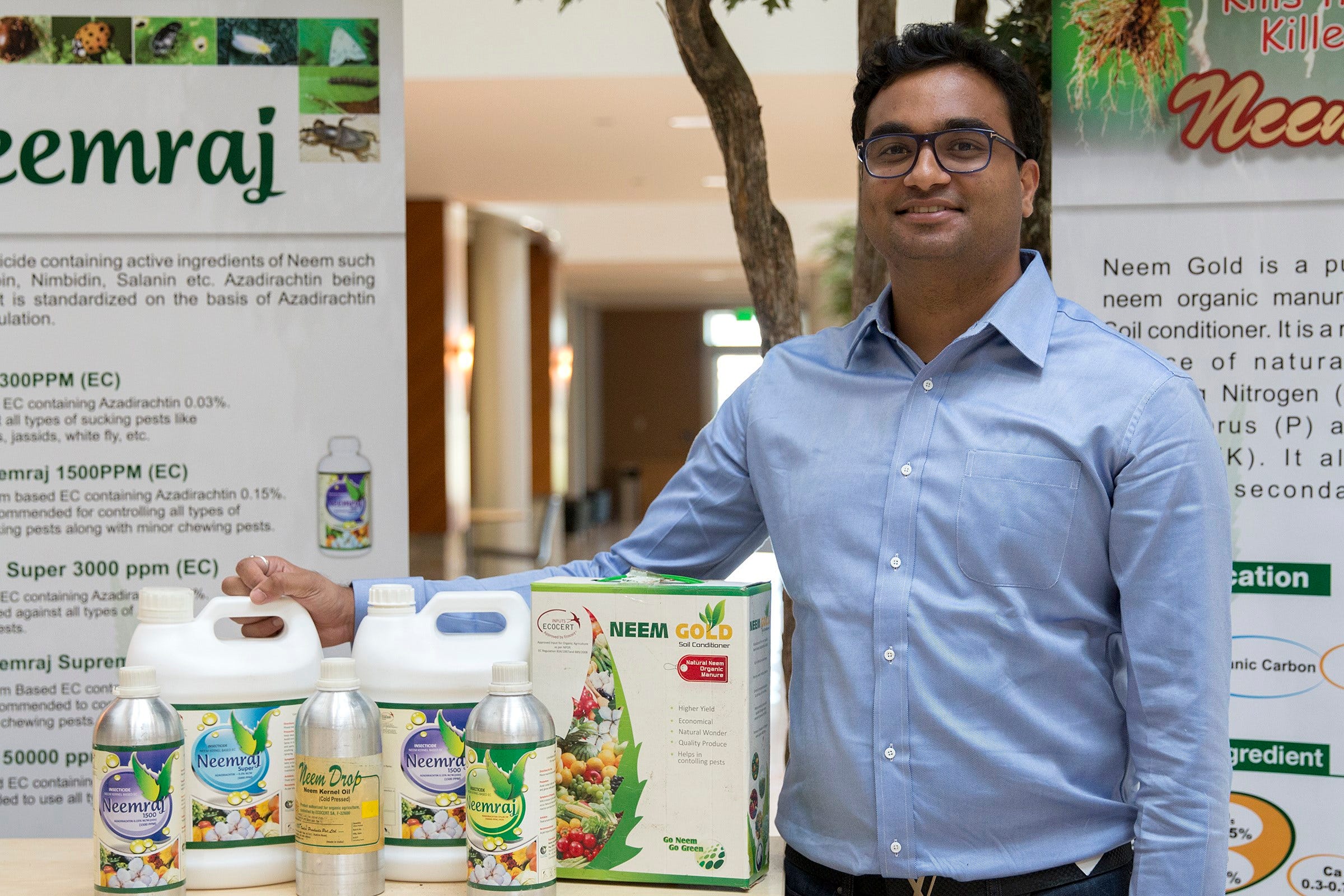Purdue Grad Brings India-Based Staple to U.S. Growers
 Joshi is targeting organic fruit and vegetable growers.
Joshi is targeting organic fruit and vegetable growers.
Subscriber Benefit
As a subscriber you can listen to articles at work, in the car, or while you work out. Subscribe NowPurdue University graduate Harsh Joshi is growing his own company, based on a tree that grows prolifically in India. The Nim tree has long been a staple in Indian life; Joshi brushed his teeth with the fibrous twigs as a child, his grandfather drank a Neem-leaf smoothie each morning and his mother used its greenery to repel pests in bags of wheat. Looking to translate its superstar status to the U.S. market, West Lafayette-based NimTree Organics is bringing Neem across the ocean to help farmers growing organic crops.
“It’s the only tree of which you can use each and every part,” says Joshi. “There are uses for the bark, the wood, the leaf, the fruit and the seeds.”
Joshi is currently selling two products: an organic pesticide, called Neem Drop, and an organic fertilizer, called Neem Gold—both made from Nim tree seeds with nothing else added.
“Just like you get olive oil by cold pressing olives, we cold press the Neem seeds, and you get the oil, which can be used as a pesticide,” says Joshi. “My competition would be something like Spinosad made by Bayer, but Neem isn’t a chemical; it’s coming straight from the plant. The oil has 21 active ingredients, and it’s just one oil you’re spraying, so it reduces the cost of the other pesticides you’d need to spray.”
The production of Neem Drop opens the door for Neem Gold fertilizer, which comes in powder and pellet form.
“The ‘sludge’ that remains after the extraction of oil, we powder it or put it in pellets and that becomes your fertilizer,” says Joshi. “Because it already has a lot of organic material in it and the pesticidal properties, it becomes a great fertilizer.”
NimTree Organic’s target customers are organic fruit and vegetable growers. Joshi says Neem has been used in the U.S. for about 20 years, so “it’s not a breakthrough by any stretch.” However, Joshi says what sets his products apart is that they’re manufactured in India by his family’s company, Neem India Products Private Ltd.
“I’m totally vertically integrated, and nobody else in the competition is vertically integrated; they contract someone in India to manufacture it, they import it and sell it. I have less people in the middle,” says Joshi. “I can play around with the margins; I can give a much better quality product, which can be customized to my customers’ needs.”
Joshi believes, despite a handful of other companies selling Neem-based pesticides and fertilizers, “there’s still room for everybody to play in the market.” Due to low awareness about Neem’s capabilities, Joshi says “the market is huge.”
NimTree Organics is focusing its marketing efforts in California, the largest producer of organic fruits and vegetables. Joshi says his main target crops are organic tomatoes, strawberries, carrots, berries and lettuce: the top California-grown crops already using Neem.
Joshi is hopeful revenue generated from Neem Drop and Neem Gold will fund the $60,000 to $100,000 needed to obtain EPA (Environmental Protection Agency) registration for a third product in the startup’s pipeline. Calling it the “most exciting one,” Joshi says the fertilizer involves extracting one of the oil’s active ingredients to make a more potent version.
Joshi left his home country in 2009 to begin his education at Purdue. After completing his master’s degree in agricultural economics, he took his business plan to the Purdue Foundry, which provides assistance to Purdue-based entrepreneurs. One service the Foundry provides is an Entrepreneur-in-Residence to help guide young businesses.
“This person is basically your mentor. When you’re starting a business, it’s very easy to get distracted. You want to focus on one thing or another, and they keep you focused on your path,” says Joshi. “It’s an experienced person to teach you; they don’t spoon-feed you, but they give you a path of where to go.”
Joshi says the planting season will begin in California in the coming days; he’s hoping to soon ink deals that will help him reach his goals of selling 27 tons by the end of 2017 and his business taking root in the U.S.
